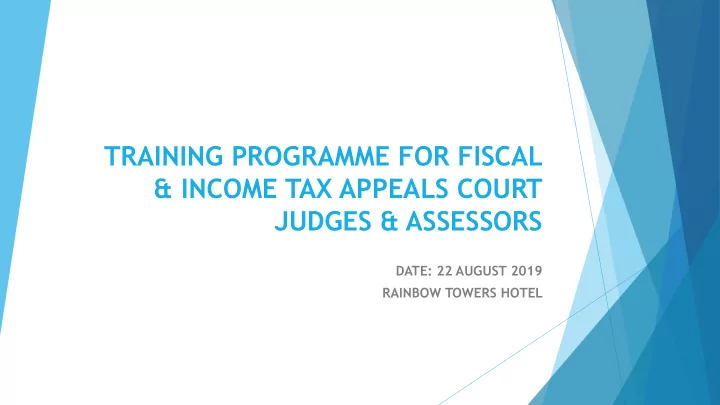

TRAINING PROGRAMME FOR FISCAL & INCOME TAX APPEALS COURT JUDGES & ASSESSORS DATE: 22 AUGUST 2019 RAINBOW TOWERS HOTEL
Presentation by A.B.C Chinake Senior Partner Kantor & Immerman
ANALYSIS OF EVIDENCE: • Importance of factual findings • The concept of tax directives
KEY FUNDAMENTALS APPLICABLE TO THE TOPIC The Fiscal Appeal Court and the Income Tax Appeal Courts operate on the same principles as any other Court in the jurisdiction. The burden of proof remains “ on a balance of probabilities "in respect of factual findings. The audi alteram partem rule remains in play. All necessary factual allegations must be made. The necessary factual findings envisaged by the law MUST be proved. It is not enough for the Court to operate on assumptions or presumptions.
TOOLS ALREADY AVAILABLE TO THE COURT High Court Rules apply. Civil Evidence Act applies. The Court has power to issue directives as regards the matters before it including: Discovery Admissibility of Documents Calling of witnesses and subpoenas Where applicable issuing public notices for other interested parties to appear and participate eg Econet vs Zimra case ( SC 17/19/1)
TAX MATTERS ARE NOTORIOUSLY “TECHNICAL” “Expert evidence” is not, not only admissible – but regularly essential. Precedent can be domestic or foreign. Use of technology is permitted including video evidence. Historical treatment of similar tax issues is useful. Evidence of prior “ tax directives ” or “ departmental guides ” or “ practices ” has been the basis of a number of decisions by the Supreme Court.
BORDER TIMBERS vs ZIMRA 2009 (1) ZLR 131 H Classification of creosote under the Customs and Excise Act. Goods embargoed. Goods perishable. Dispute took more than three (3) years to resolve. Goods moribund. Historical tariff application upheld. Embargo unlawful. Historical tariff applied. Importer sued for damages.
THE LESSONS • Facts Facts Facts • Practice Practice Practice
PRE-LITIGATION COMMUNICATION Emails. Minutes of meetings. Tax directives. Assessments. Waivers. Under takings. Acknowledgements. Corporate records.
INADMISSABLE EVIDENCE “By hook or by crook……………………………… …………….Thou shall not prosper”
FACTS FIRST …………THEN THE LAW FOLLOWS
THE QUESTION OF ONUS Every hearing raises fresh issues. The onus isn’t always on the Applicant. DETERMINE THE ISSUES THEN DECIDE THE ONUS .
BETTER USE OF PRE-TRIAL PROCEDURES Can we adopt formal case management processes? The benefits of adoption of case management as regards evidence presentation.
TAX DIRECTIVES AND THEIR IMPACT ON LITIGATION
LITIGATING WITH INTERGRITY Basic tests What does the Law say? 1 Did it change in the period of the dispute? 2 Where any tax directives issued? 3 What was the practice? 4 Did the parties reach an “accommodation”? 5 What facts have been established? 6 How do we apply the law to the facts in the circumstances? 7
CONCLUSION Per Lord Denning: “the duty of counsel to his client in a civil case or in defending an accused person – is to make every honest endeavour to succeed. He must not, of course, knowingly mislead the court, either on the facts or on the law, but, short of that, he may put such matter in evidence or omit such others as in his discretion he thinks will be most to the advantage of his client” In Tombling vs Universal Bulb Company Limited (1951) 67 TLR 289 at 297
Siyabonga Thank you Tinotenda
Recommend
More recommend